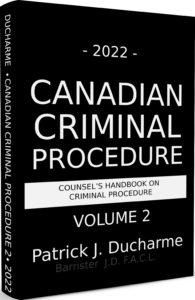 |
| Patrick J Ducharme |
In R v. McNeil 1the Supreme Court of Canada discussed the duty of the police to disclose to the Crown the “fruits of the investigation.” The court held that, Under our Canadian system of law enforcement, the general duty to investigate crime falls on the police, not the Crown. The fruits of the investigation against an accused person, therefore, will generally have been gathered, and any resulting criminal charge laid, by the police. While the roles of the Crown and the police are separate and distinct, the police have a duty to participate in prosecutions: see, for example, s. 42(1)(e) of the Ontario Police Services Act. Of particular relevance here is the police’s duty to participate in the disclosure process. The means by which the Crown comes to be in possession of the fruits of the investigation lies in the corollary duty of police investigators to disclose to the Crown all relevant material in their possession. The police’s obligation to disclose all material pertaining to the investigation of an accused to the prosecuting Crown was recognized long before Stinchcombe. The state of the law was well summed up by the Honourable G. Arthur Martin, Q.C., in his Report of the Attorney General’s Advisory Committee on Charge Screening, Disclosure, and Resolution Discussions (1993), (“Martin Report”), at pp. 167-68:
Continue reading “Role of the Police in Disclosure”




